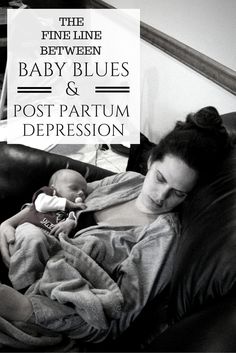Blog
Momma Maternal Health - Part I
We've heard of the "baby blues" but what does this really mean? How can a joyous event such as the birth of a child cause sadness or even depression? Doesn't quite make sense or does it?
Let's go back in time and look at the evolution of women's mental health especially as it pertains to pregnancy and delivery. It is a dark history but we are slowly emerging into the light.
Post delivery sadness was recognized by Hippocrates as far back at the 5th century BC. The earliest reports of emotional difficulties after childbirth were reported back in 700 BC.
In the Middle Ages (5th - 15th centuries), women with mental health symptoms were thought to be witches or the victims of witchcraft. Not a particularly enlightened time in history for women's health.
In the 1920's, some subscribed to Freudian theories that postpartum depression was due to sexual frigidity, suppressed homosexual urges or incestuous rage. Always about sex with Freud!
In the 1950's, popular women's magazines such as Ladies Home Journal began to publish articles that raised awareness of postpartum mental illness. However, many women were labeled neurotic and subjected to unconventional treatment such as chronic valium sedation, electroshock therapy or being committed to an asylum.
In the 1990's, postpartum depression is officially listed in the The Diagnostic and Statistical Manual of Mental Disorders (DSM) as a major depressive disorder that occurs within 4 weeks of childbirth. That definition is essentially unchanged today but is now listed as a subset of mood disorders occurring shortly after giving birth. There is debate about this rigid criteria of 4 weeks post delivery.
In the 2000 era, postpartum depression has become more well known, understood and accepted. Many celebrities from Brooke Shields to Gywneth Paltrow have shed light on their experiences and helped normalize the condition. More research is getting done to better understand maternal mental illness and the treatments that are needed. Women have begun to seek treatment and medical providers have begun to screen women for post partum depression.
So, what exactly are the baby blues and how is it different than postpartum depression?
Baby blues is a depressed mood that occurs about 3-4 days after the baby is born and usually lasts for 2-3 weeks and resolves. Baby blues is characterized by crying, anxiety, depressed mood, insomnia, poor concentration and fatigue. About 50-70% of women experience baby blues.
In contrast, postpartum depression has all of the above symptoms with a more severely depressed mood including irritability. Postpartum depression may start during pregnancy or later in infancy beyond the DSM criteria of 4 weeks after birth.
Women are vulnerable to depression at many points during the reproductive cycle. Childbirth is a particularly vulnerable time as the hormonal shifts that affect a mother's brain are huge. In addition, the mother is now balancing caring for another human with cultural (and her own) expectations of motherhood.
Stay tuned for Momma Mental Health - Part II. We'll discuss our modern day understanding of postpartum depression and its impact on the mother as well as her child. We are learning that depression is only one possibility; many women suffer from anxiety, obsessive-compulsive disorder and even bipolar disorder. Part II will provide resources for seeking help for postpartum mental illness.
Yoga can be an exceptional way to support both physical and mental health after giving birth to a child. Whole Yoga & Wellness is offering a 6-week postnatal yoga class series starting Monday, January 8, 2018 from 7:30-8:45p. The class is appropriate for mothers who have given birth in the past year and no yoga experience is necessary. Specifically, we will explore yoga practices to support mental health and the healing of the pelvic floor muscles. The class will be led by integrative physician and yoga teacher, Dhanu Sant. As a pediatrician, Dr. Sant has a particular interest in maternal health because of its impact on infant and child well-being. Remember if you are mother of a patient at WholeKids Pediatrics, you qualify for a 10% discount on all classes and series. To learn more or register, go to www.wholekidspediatrics.com/yoga-and-wellness.

